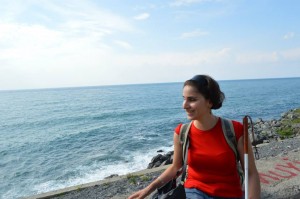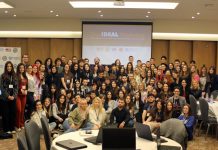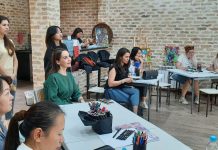On Monday, November 25, FLEX alumna Mariam Mikiashvili ’05 from Tbilisi, Georgia, was the guest speaker for an online training in preparation for International Day of People with Disabilities (December 3), organized by the Eurasia FLEX Alumni Program.
Mariam spoke to 10 FLEX alumni coordinators and American Councils staff members about a variety of topics related to effective communication with people who are blind or visually impaired. She shared the National Council for the Blind’s leaflet on “Ethical Communication with the Blind,” as a resource, and reviewed key points of etiquette.
One of her most powerful messages was the importance of asking disabled people how you can help them. She stressed that the disabled people have to be the ones to explain exactly what kind of assistance they to do or do not need. She shared her own experiences in learning to speak up for herself. Mariam said that while it might seem obvious, many people who don’t have experience communicating with blind people either make the mistake of not asking how they can help or of not listening to the disabled peoples’ requests.
She also shared information about accessible technologies that assist blind people, including Braille printers and writing machines. Mariam explained that she was first introduced to many of these tools as an exchange student. She introduced listeners to NVDA (NonVisual Desktop Access), which is free software, enabling blind and vision impaired people to use a computer by communicating what is on the screen using synthetic voice or braille.
Alumni Coordinators then asked Mariam to share her experience on how best to include more disabled alumni in their events, not just for International Day of People with Disabilities, but throughout the year. She encouraged alumni to reach out to the disabled alumni personally and find out about their interests and concerns, so as to make them feel comfortable and welcome at events. She reminded event organizers to consider whether their activities, especially ice-breakers, are visually oriented. She explained that it is possible to modify activities so that more audio is used and that visuals are always described for those who can’t see what is being shown.
One of the online training participants was Northwest Russia FLEX Alumni Coordinator Andrey Bayev ’11. After the event he wrote, “Apart from having learned a lot about the ethics of working with visually impaired persons, this session helped me learn the importance of involving physically disabled people in the work we do, something that we always struggle to achieve. Mariam’s experience and expertise inspired me to action, and provided me with valuable advice and suggestions on how to resolve an issue that was preventing us from implementing a disability accessibility project.”







